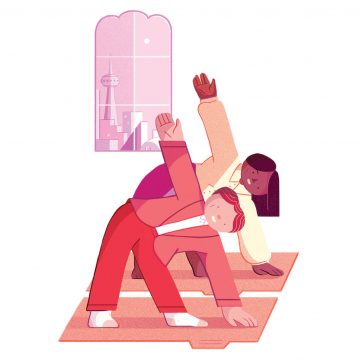For Krista Kais-Prial, an associate at the employment-and-labour firm Israel Foulon LLP, the Thirst for Knowledge Employment Law Gala is unmissable. “It’s a nerdy subset of the Ontario Bar Association that does these employment-law events,” she explains. The annual holiday party is a chance to meet face-to-face with that small cohort of Ontarians who spend their days the same way she does: poring over termination letters, collective agreements and commentary on changes to the Employment Standards Act. The reception, at the DoubleTree Hilton, typically begins with cocktails, followed by dinner, speeches and an employment-law quiz show. The winning table gets a bottle of champagne.
At some point after dinner, the party moves to 2Cats, a dive bar on King West. As blood-alcohol levels go up, the vibe switches from geeky to messy.
On the morning after Thirst for Knowledge 2018, Kais-Prial arrived at work feeling headachy and exhausted. She began writing a letter to opposing counsel but found her attention waning. The situation seemed absurd: here she was, struggling to do her job because she’d been drinking, an activity that, while common in the legal profession, has nothing to do with the practice of law. “The legal industry is old-fashioned,” she says. “There’s this Mad Men self-perception, but Mad Men is problematic and out-of-date.”
That’s when she decided to make a change. Kais-Prial has never had anything close to a drinking problem, but she argues that sobriety isn’t only for recovering alcoholics. “You don’t have to hit rock bottom before making a change,” she says. On New Year’s Eve, she attended a friend’s wedding and had a midnight glass of champagne to ring in the start of 2019, a year she decided to spend completely sober. That experiment has transformed the way she lives, works and socializes. And it has clued her in to a fact that’s been hiding in plain sight: there are other people like her — young lawyers who are quietly rebelling against the boozy norms of their industry.
It’s undeniable that lawyers — particularly young lawyers — face tremendous pressure to drink. At Osgoode Hall Law School, Cristina Candea was the furthest thing from a partier; she was the kind of person who could nurse an old fashioned until it turned watery and warm. As an articling student in 2018–19, however, she found herself boozing it up several nights each week. The older associates at her University Avenue chambers would pile on the Jameson shots, either at the office or at the Moxie’s Grill and Bar down the block. “I was still growing my social circle in the industry,” she says. “Drinking was a bonding exercise.”
In September, having landed an associate position at Berkes Law, a criminal-defence firm — and having fielded a few calls from friends who were concerned about her drinking — Candea decided to go sober for a month, if only to gain perspective on her habits. Two weeks later, she made a list of the ways her life had changed: she was more energetic and engaged, less irritable and increasingly disciplined about hitting the gym. Also, she was edging back into hobbies, like playing piano and painting, that she’d neglected since finishing school.
When her sober month ended, she returned to drinking but only lightly and mindfully. It helps that her new boss respects her personal autonomy. (Candea thinks that her decision to cut back would have been supported at her old office,too.) But the question remains: had she ended up elsewhere, would she have had a harder time easing off the booze?
Similarly, when Kais-Prial went sober, she worried about potential damage to her professional status. As an executive on both the OBA’s Young Lawyers Division and its Labour and Employment Section, she’d worked hard at networking. But would she now be excluded from get-togethers? Would colleagues consider her uptight?
She’s since found ways to reconcile her sobriety with her social and professional life. For instance, she frequently engages with colleagues over daytime activities like yoga, spin classes and afternoon teas, and the energy boost she’s gotten from not drinking enables her to get out more. “I’d rather go to 10 events and have soda water,” she says, “than only make it to five.”
Also, since she went sober, something unexpected has happened. Before 2019, she hadn’t noticed that some of her colleagues had been ordering virgin cocktails on the sly. But they started to notice her sobriety and reached out to offer support or seek advice. It was as if she’d been inducted into a secret society of young, health-conscious lawyers. These colleagues care deeply about the profession, says Kais-Prial, but they also care about wellness and don’t see why they must choose between the two.
Slowly, it seems, the word is getting out. Last spring, after a meeting of the Young Lawyers Division, Kais-Prial and a few other executives convened at Beerbistro for an informal chat. When she ordered a non-alcoholic beer, it was as if she’d given the people around her permission to abstain. The colleague beside her asked for a tea; somebody else requested a virgin Caesar. In the end, the number of drinkers at the table matched the number of non-drinkers. “There was communal solidarity,” says Kais-Prial. “We were encouraging each other.”
In 2020, Kais-Prial has started to have wine with dinner again, but she won’t be returning to the hard-drinking scene. “I want to demonstrate that there can be other ways to make it in the industry,” she says. “You can find like-minded people and bond without getting wasted at some bar. You don’t have to drink to be one of the cool kids.”
This story is part of “The lawyer’s guide to not drinking,” published in our Spring 2020 Issue.
Illustration by Wenting Li


